Skulls Unlimited cleans over 50,000 skulls a year.
Learn More!

Filthy Rich Businesses. Want to be disgustingly happy? Start a disgusting business.
Feb 2, 2007
Geoff Williams, Entrepreneur.com
Jay Villemarette cleans skeletons--mostly animal and human skulls--for a living. He owns Skulls Unlimited International and insists there's never a dull moment at the office. We'll take his word for it. After all, his company might be cleaning a gorilla skull one day and that of a chipmunk, a giraffe or a human the next.
But that doesn't mean he finds all the company's projects pleasant. "We don't like working on humans," concedes the 41-year-old entrepreneur. "As a whole, we'd rather not do it." Is that because it's morbid and sad and gross?
"No, that's not it," says Villemarette. "They're just bones. It doesn't bother us that they're human. But humans are really greasy because of what we eat, like Doritos and burgers. We've worked on lots of body parts, and they all seem to have the same smell. But humans, like bears, have their own distinct odor." Not an odor of death, Villemarette elaborates, but more like something that has spoiled in the pantry. While his company might charge in the neighborhood of $7,500 to clean a human skeleton, a bear skeleton--even with its distinct odor--would cost much less.
Revolting. Disgusting. Messy. Repellent. Repulsive. Whichever word you use to describe some businesses, there's something that many of the least glamorous industries--think sewage, garbage, skulls--have in common. They're almost always important to society, and they're frequently industries that can make an entrepreneur very wealthy. But even more surprising?
These entrepreneurs are happy. In fact, they may be happier than you are.
At first glance, you might look at Skulls Unlimited International in Oklahoma City, probably one of the only businesses in the world that specializes in cleaning human and animal skulls, and think, "Gee, I wish it were limited. Why would anyone want a skull, no matter how clean it is?" But museums, veterinary and medical schools, and other educational groups might take umbrage with that assessment. There are enough of these establishments, in fact, that Villemarette needs 13 full-time staffers and two part-timers and expects his company to break $2 million in sales this year. And it all began when he found a dog's skull in the woods at age seven. Later, after finding a cat skull, he began studying the similarities, having been bitten by the biology bug. He soon became a self-proclaimed skull junkie.
He admits it's an unusual career: "My wife used to cry herself to sleep at night because her husband was starting a business in cleaning skulls," says Villemarette, joking. At least, we think he's joking. In any case, his wife isn't crying now, and Villemarette is as happy as a clam skull would be--if clams had skulls.
Mike Rowe, the host of Dirty Jobs on [The Discovery Channel], says that Villemarette's attitude isn't uncommon. Rowe, who has featured Skulls Unlimited on his series, has met many entrepreneurs and employees in dirty jobs, and they've made quite an impression on him, especially when he sees how happy these people often are, even those clinging to the lowest rung on the ladder. In fact, there's a lot that entrepreneurs can learn from the employees who do the most back-breaking, disgusting, dirty sort of work.
"Most of the people I've met on this gig are happier, more adjusted and balanced than anyone else I've met," says Rowe, who thinks that's partially because the jobs typically begin and end within a predictable period of time. "You end up living a more balanced life. When you go home, you aren't taking your work home with you."
[article edited for space]

Leave a comment